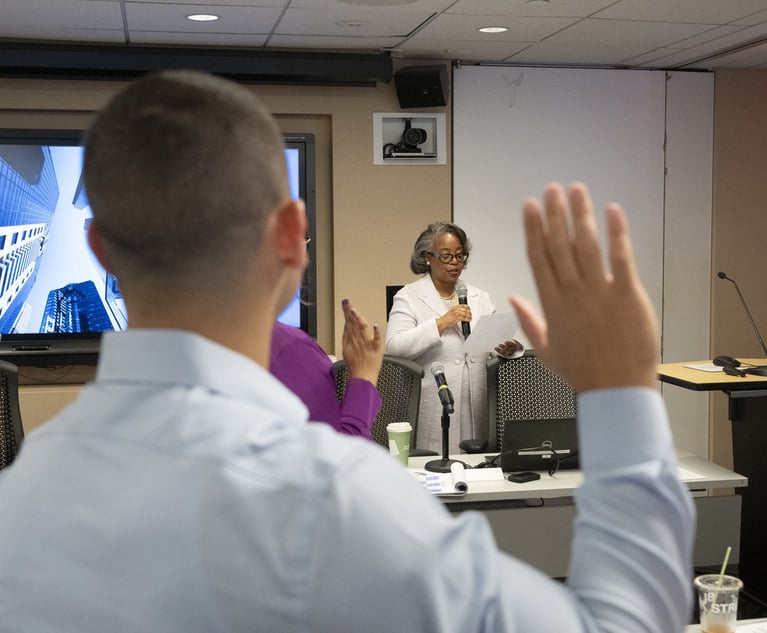 Dan Mathews, partner at Orrick, Herrington & Sutcliffe. Photo: Ryland West/ALM
Dan Mathews, partner at Orrick, Herrington & Sutcliffe. Photo: Ryland West/ALM Lifetime Achievement: Dan Mathews
"Dan's intellect, uncanny business acumen and creative drive are legendary among clients and counterparties alike."
October 07, 2021 at 01:45 PM
5 minute read
Considered one of the founding fathers of Public-Private Partnerships (P3s) in the United States, Dan Mathews has spent the last 20 years solving for our country's most critical infrastructure needs. Decades before President Biden's $1 trillion Build Back Better infrastructure bill was conceived, Dan was forging multi-billion dollar projects across the nation, utilizing a unique partnership structure between public owners and investors designed to bridge funding gaps and harness the innovative power of the private sector. Dan's intellect, uncanny business acumen and creative drive are legendary among clients and counterparties alike.
There are now many attorneys claiming to be infrastructure experts. But Dan stands, and will always stand, in a category all his own. Dan laid the legal foundation for P3s in the United States, having designed and shaped many of their principles in the inaugural projects of the early 2000s that now form the building blocks of all P3 projects. Among many instances in which he rose to the occasion over his 45-year career, in 2002, Dan created a first-of-a-kind framework that allowed a federal lending program called TIFIA to provide funding into the first major U.S. P3 toll road project in the United States. That framework has allowed the financing of dozens of projects over the years, and without which roads, bridges and mass transit vital to this nation's well-being would not have been built. Dan's contribution to P3s is especially timely, given the success of the Biden plan heavily relies on P3s. His groundbreaking work in this space will serve as the blueprint and the nation's best chance to achieve the greatest revitalization of U.S. infrastructure since the FDR administration. Dan is not one to seek the limelight in any of his accomplishments, but it is indisputable that his influence in this space extends well beyond advancing the country's infrastructure. In many ways, his work has supported the creation of countless jobs, fostered community development, and improved the lives of so many who rely on the nation's infrastructure network to travel, work and provide for their families.
This content has been archived. It is available through our partners, LexisNexis® and Bloomberg Law.
To view this content, please continue to their sites.
Not a Lexis Subscriber?
Subscribe Now
Not a Bloomberg Law Subscriber?
Subscribe Now
NOT FOR REPRINT
© 2025 ALM Global, LLC, All Rights Reserved. Request academic re-use from www.copyright.com. All other uses, submit a request to [email protected]. For more information visit Asset & Logo Licensing.
You Might Like
View All

Office of the Appellate Defender To Host Its Annual 'First Monday' Event Tonight
2 minute read
NYC Law Department Swears in New Class of Assistant Corporation Counsels
Law Firms Mentioned
Trending Stories
Who Got The Work
J. Brugh Lower of Gibbons has entered an appearance for industrial equipment supplier Devco Corporation in a pending trademark infringement lawsuit. The suit, accusing the defendant of selling knock-off Graco products, was filed Dec. 18 in New Jersey District Court by Rivkin Radler on behalf of Graco Inc. and Graco Minnesota. The case, assigned to U.S. District Judge Zahid N. Quraishi, is 3:24-cv-11294, Graco Inc. et al v. Devco Corporation.
Who Got The Work
Rebecca Maller-Stein and Kent A. Yalowitz of Arnold & Porter Kaye Scholer have entered their appearances for Hanaco Venture Capital and its executives, Lior Prosor and David Frankel, in a pending securities lawsuit. The action, filed on Dec. 24 in New York Southern District Court by Zell, Aron & Co. on behalf of Goldeneye Advisors, accuses the defendants of negligently and fraudulently managing the plaintiff's $1 million investment. The case, assigned to U.S. District Judge Vernon S. Broderick, is 1:24-cv-09918, Goldeneye Advisors, LLC v. Hanaco Venture Capital, Ltd. et al.
Who Got The Work
Attorneys from A&O Shearman has stepped in as defense counsel for Toronto-Dominion Bank and other defendants in a pending securities class action. The suit, filed Dec. 11 in New York Southern District Court by Bleichmar Fonti & Auld, accuses the defendants of concealing the bank's 'pervasive' deficiencies in regards to its compliance with the Bank Secrecy Act and the quality of its anti-money laundering controls. The case, assigned to U.S. District Judge Arun Subramanian, is 1:24-cv-09445, Gonzalez v. The Toronto-Dominion Bank et al.
Who Got The Work
Crown Castle International, a Pennsylvania company providing shared communications infrastructure, has turned to Luke D. Wolf of Gordon Rees Scully Mansukhani to fend off a pending breach-of-contract lawsuit. The court action, filed Nov. 25 in Michigan Eastern District Court by Hooper Hathaway PC on behalf of The Town Residences LLC, accuses Crown Castle of failing to transfer approximately $30,000 in utility payments from T-Mobile in breach of a roof-top lease and assignment agreement. The case, assigned to U.S. District Judge Susan K. Declercq, is 2:24-cv-13131, The Town Residences LLC v. T-Mobile US, Inc. et al.
Who Got The Work
Wilfred P. Coronato and Daniel M. Schwartz of McCarter & English have stepped in as defense counsel to Electrolux Home Products Inc. in a pending product liability lawsuit. The court action, filed Nov. 26 in New York Eastern District Court by Poulos Lopiccolo PC and Nagel Rice LLP on behalf of David Stern, alleges that the defendant's refrigerators’ drawers and shelving repeatedly break and fall apart within months after purchase. The case, assigned to U.S. District Judge Joan M. Azrack, is 2:24-cv-08204, Stern v. Electrolux Home Products, Inc.
Featured Firms
Law Offices of Gary Martin Hays & Associates, P.C.
(470) 294-1674
Law Offices of Mark E. Salomone
(857) 444-6468
Smith & Hassler
(713) 739-1250







